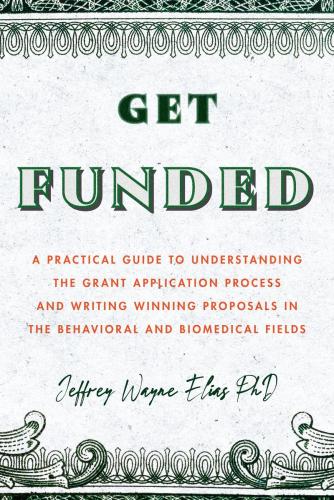Get Funded: A Practical Guide To Understanding The Grant...
| Item Information | |
|---|---|
| Item#: | 9781433836442 |
| Author | Elias, Jeffrey Wayne |
| On Hand | 0 |
An essential guide for those who wish to hone their skills in writing successful grant applications.
Scientific research relies on funding, and everyone who conducts research must become adept at funding their research. This book explains how to attain the number one source of research funding: grants. Readers will learn how to prepare grant proposals, how and when to interact with funding institutions, how to interpret and respond to peer review feedback, and much more. Most importantly, they will learn how to identify and convey what makes their proposed research impactful, innovative, and achievable.
Author Jeffrey Wayne Elias has an extensive career in grant funding, including 27 years in academia working on grant support and grant reviewing, plus 19 years in grant management and administration. This experience affords him a well-rounded perspective on why some applications succeed while others don’t. Elias helps readers develop and strengthen their ability to navigate the grant application process—ultimately enabling them to achieve “grant literacy.”
Scientific research relies on funding, and everyone who conducts research must become adept at funding their research. This book explains how to attain the number one source of research funding: grants. Readers will learn how to prepare grant proposals, how and when to interact with funding institutions, how to interpret and respond to peer review feedback, and much more. Most importantly, they will learn how to identify and convey what makes their proposed research impactful, innovative, and achievable.
Author Jeffrey Wayne Elias has an extensive career in grant funding, including 27 years in academia working on grant support and grant reviewing, plus 19 years in grant management and administration. This experience affords him a well-rounded perspective on why some applications succeed while others don’t. Elias helps readers develop and strengthen their ability to navigate the grant application process—ultimately enabling them to achieve “grant literacy.”
Short Description
An essential guide for those who wish to learn the basics or hone their skills in writing successful grant applications.
Table of Contents
Introduction: Who Is This Book For, and What Is It About?
Part I: Understanding the Context of Grant Funding and Preparing to Write
Chapter 1. Developing Grant Literacy
Chapter 2. Navigating a Funding Announcement
Chapter 3. How Grant Policy Influences Study Design
Part II: Writing the Application
Chapter 4. General Grant Writing Tips: Dos and Don'ts
Chapter 5. How to Structure the Aims of an Application to Meet the Reviewer's Expectation
Chapter 6. Promoting the Aims in the Significance, Innovation, and Approach Sections
Part III: Influencing and Responding to Reviewer Feedback
Chapter 7. Understanding and Writing for the Review Process
Chapter 8. Responding to Review Feedback and Preparing for Potential Resubmission
Part IV: Nontraditional Grants
Chapter 9. Training Grants
Chapter 10. Small Business Grants: Commercialization of Research
Part V:Advanced Grant Writing
Chapter 11. Time and Team Communication Management Strategies
Chapter 12. Beyond the First Grant: Experience Provides Perspective on Writing and Funding
References
Part I: Understanding the Context of Grant Funding and Preparing to Write
Chapter 1. Developing Grant Literacy
Chapter 2. Navigating a Funding Announcement
Chapter 3. How Grant Policy Influences Study Design
Part II: Writing the Application
Chapter 4. General Grant Writing Tips: Dos and Don'ts
Chapter 5. How to Structure the Aims of an Application to Meet the Reviewer's Expectation
Chapter 6. Promoting the Aims in the Significance, Innovation, and Approach Sections
Part III: Influencing and Responding to Reviewer Feedback
Chapter 7. Understanding and Writing for the Review Process
Chapter 8. Responding to Review Feedback and Preparing for Potential Resubmission
Part IV: Nontraditional Grants
Chapter 9. Training Grants
Chapter 10. Small Business Grants: Commercialization of Research
Part V:Advanced Grant Writing
Chapter 11. Time and Team Communication Management Strategies
Chapter 12. Beyond the First Grant: Experience Provides Perspective on Writing and Funding
References

